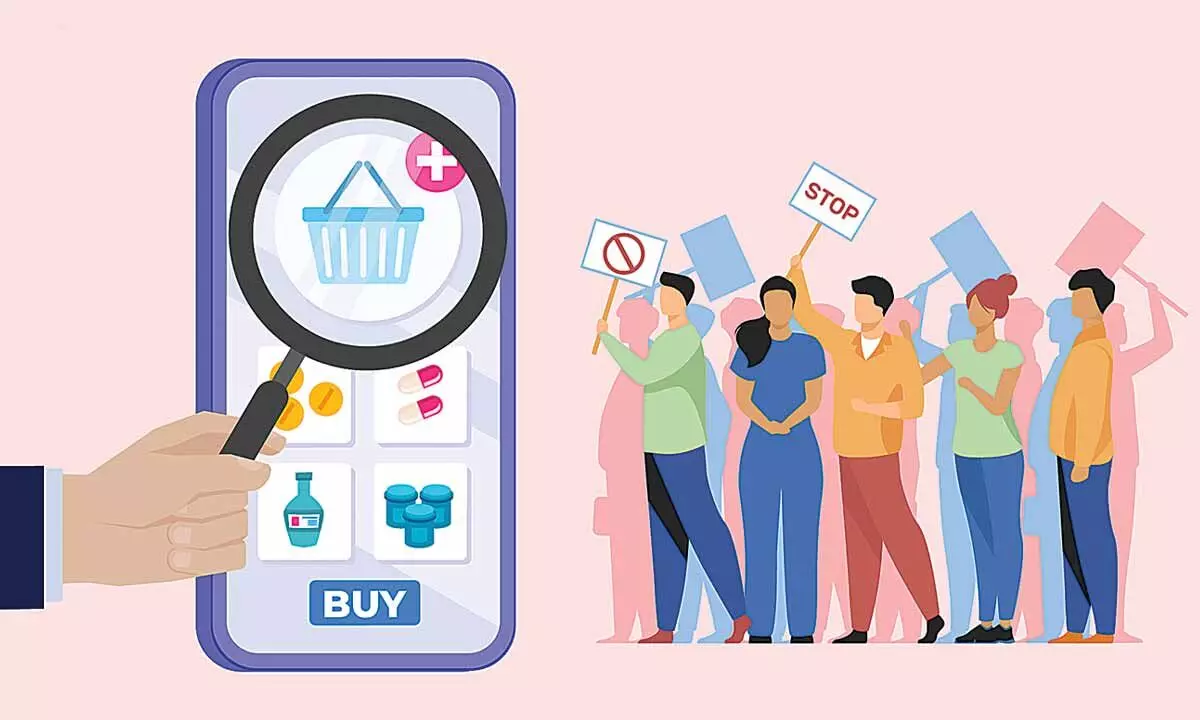Left unregulated, sordid pharma trade practices could turn fatal
Covid-induced lockdown opened the floodgates for e-pharmacies to make a killing
image for illustrative purpose

While the nation’s pharmacy market is brimming with activity with the entry of billionaires like Jeff Bezos and Mukesh Ambani in the fledgling sector, the cut-throat competition among the peers has brought in its wake several unethical trade practices like predatory pricing and indiscriminate discounts
More than 10 lakh pharmaceutical traders across the length and breadth of the country are on the warpath against ‘unethical trade’ practices, like predatory pricing, being followed by big corporate chain of pharmacies and other e-pharmacy players in the country.
It is true that the last couple of years have seen the emergence e-pharmacies and corporate chains, which not only offer whopping discounts that go up to 80 per cent but also give wide publicity to the tempting offers to woo potential customers. There are allegations that the ‘an unholy alliance between corporate entities, regulatory officials and pharma manufacturing industry’ is behind the upsurge of the chain pharmacies, which brazenly violate the MRP structure put forth by the national drug pricing regulator, the National Pharmaceutical Pricing Authority (NPPA).
The government and top bureaucrats are aware of the murky happenings in the pharmaceutical trade industry. However, they are hesitant to restrain the huge lobby, which has considerable influence in the corridors of power.
With the entire medicine business gradually, but steadily, moving into the hands of corporate entities, the All India Organisation of Chemists and Druggists (AIOCD), the representative body of more than 10 lakh chemists across the country, has raised the banner of revolt against the unethical trade practices that have crept in.
The rise of e-pharmacies and chain pharmacies is bound to have a devastating impact on the livelihood of millions of those dependent on the traditional offline pharma retail and wholesale supply chain. In fact, the national trade body has for long been demanding Centre’s intervention and stringent action against the illegal monopolistic practices of e-pharmacies, but in vain.
With myriad such pleas falling on deaf ears, the AIOCD announced a nationwide protest “Galli Se Delhi Tak Halla Bol” against the monopolistic business practices of e-pharmacies on February 15, which was deferred at the eleventh hour following the intervention of Union Health Minister Mansukh Mandaviya.
It is true that many big corporate entities have entered the lucrative online pharmacy market, especially in the urban areas. Even as every Indian was compelled to stay indoors because of Covid-induced lockdown, people began availing facilities offered by e-pharmacies. While people were vying with each other to order all the items under the sun through e-commerce to maintain social distancing, the e-commerce service was not legally available to everyone because of the government’s inordinate delay in finalizing e-pharmacy guidelines.
As the potential of the sector is gradually but steadily unfolding in the country in the wake of people’s preference for door delivery of medicines, big players are now vying with each other to get a substantial part of the e-pharmacy pie.
Close on the heels of the US-based e-commerce behemoth Amazon’s entry into the sector three years ago, Indian retail giant Reliance Retail has also thrown its hat in the ring. Hoping to exploit the fast-growing market fuelled by a large base of Smartphone users, Reliance has acquired a majority equity stake in Chennai-based online pharmacy company Netmeds for around Rs. 620 crore. Earlier, another online pharmacy player PharmEasy had agreed to merge with its smaller rival Medlife. Walmart-owned Flipkart has also forayed into the e-pharmacy space. It has over 50 platforms providing services to nearly 22,000 pin codes across the country. It is apparent that from Amazon to Reliance, major players have entered the pharmacy race to scale up, consolidate and corner a share of the pharmacy market. While the nation’s pharmacy market is brimming with activity with the entry of billionaires like Jeff Bezos and Mukesh Ambani in the fledgling sector, the cut-throat competition among the peers has brought in its wake several unethical trade practices like predatory pricing and indiscriminate discounts. There are allegations that while the government licensed brick and mortar retailers are getting 16 per cent margin on scheduled drugs and 20 per cent on non-scheduled drugs, the e-pharmacies and corporate retail chains are offering 30 to 40 per cent discounts by advertising, in contravention to the provisions of drug norms.
The government should immediately take measures to stop the unethical trade practices in the pharmaceutical trade as there are fears that discount sales may generate widespread presence of substandard and spurious medicines in the market.
(The author is a freelance journalist with varied experience in different fields)

